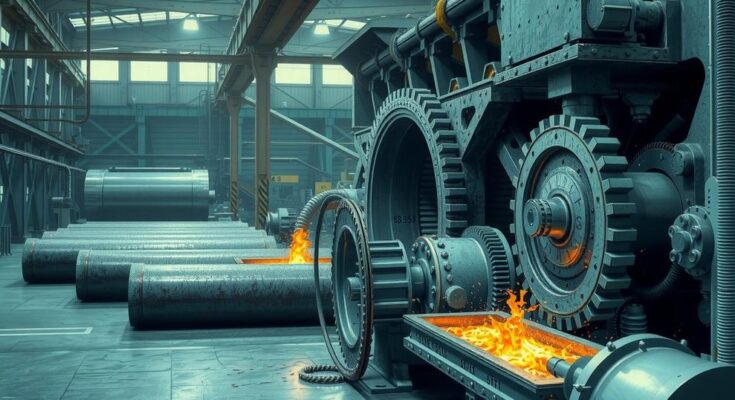The Brazilian government has renewed tariffs and import quotas on steel products to protect domestic manufacturers from rising imports. This decision reflects the ongoing challenges within the steel market and is timely as CSN reports significant financial growth. Industry representatives see potential for negotiations with the U.S. on quotas, indicating shifts in trade relationships may lie ahead.
In a significant move affecting the steel industry, the Brazilian government recently announced the renewal of tariffs and import quotas on steel products. This decision marks an effort to protect local producers amidst global market fluctuations and rising imports. Steel imports to Brazil have been on the rise, prompting regulators to take these measures to bolster domestic manufacturing.
The renewed tariffs come at a time when Brazil’s steel sector is dealing with various economic challenges, including demand shifts and international competition. Local companies such as Companhia Siderúrgica Nacional (CSN) have been particularly vocal about needing this kind of protection to maintain their market share and ensure their operations remain viable.
CSN’s financial data indicates strong resilience despite the turbulent market. The company recently reported an adjusted EBITDA of 2.5 billion reais for the first quarter of 2025, reflecting a notable year-on-year increase of 27.6%. This uptick in financial performance showcases CSN’s efforts to adapt to changing market conditions and emphasizes the importance of local policies in supporting such outcomes.
ArcelorMittal, another key player in the Brazilian steel market, has expressed that May is a pivotal month for deciding on further investments in Brazil. Their increasing interest in the domestic market highlights the significance of government policy in shaping investment trajectories in the steel sector.
Despite these tariffs, industry leaders believe negotiations with sources such as the United States could potentially yield more favorable outcomes. CSN has indicated that there could be opportunities for future discussions regarding steel quotas, particularly with regard to export and trade relations.
Furthermore, the broader development of Brazil’s steel and mining sectors indicates an upward trend, as evidenced by associated growth figures. For instance, reports suggest a 9.1% increase in revenues for the Brazilian mining sector in 2024, illustrating the significant economic potential of these industries in the country.
This policy renewal is likely to influence various stakeholders in the Brazilian steel supply chain. While it primarily aims to safeguard the interests of local producers, consumers and importers may also feel the repercussions of increased tariffs. As these situations develop, stakeholders will be closely monitoring the implications of such measures on market dynamics and international trade partnerships.
The Brazilian government’s renewal of tariffs and quotas on steel products aims to protect local manufacturers from rising imports and market volatility. This measure comes as companies like CSN report strong financial results, indicating resilience in the face of economic challenges. As discussions about potential negotiations with the U.S. on steel quotas continue, the outcomes will likely influence the future of Brazil’s steel industry and its position in the global market.
Original Source: www.marketscreener.com




